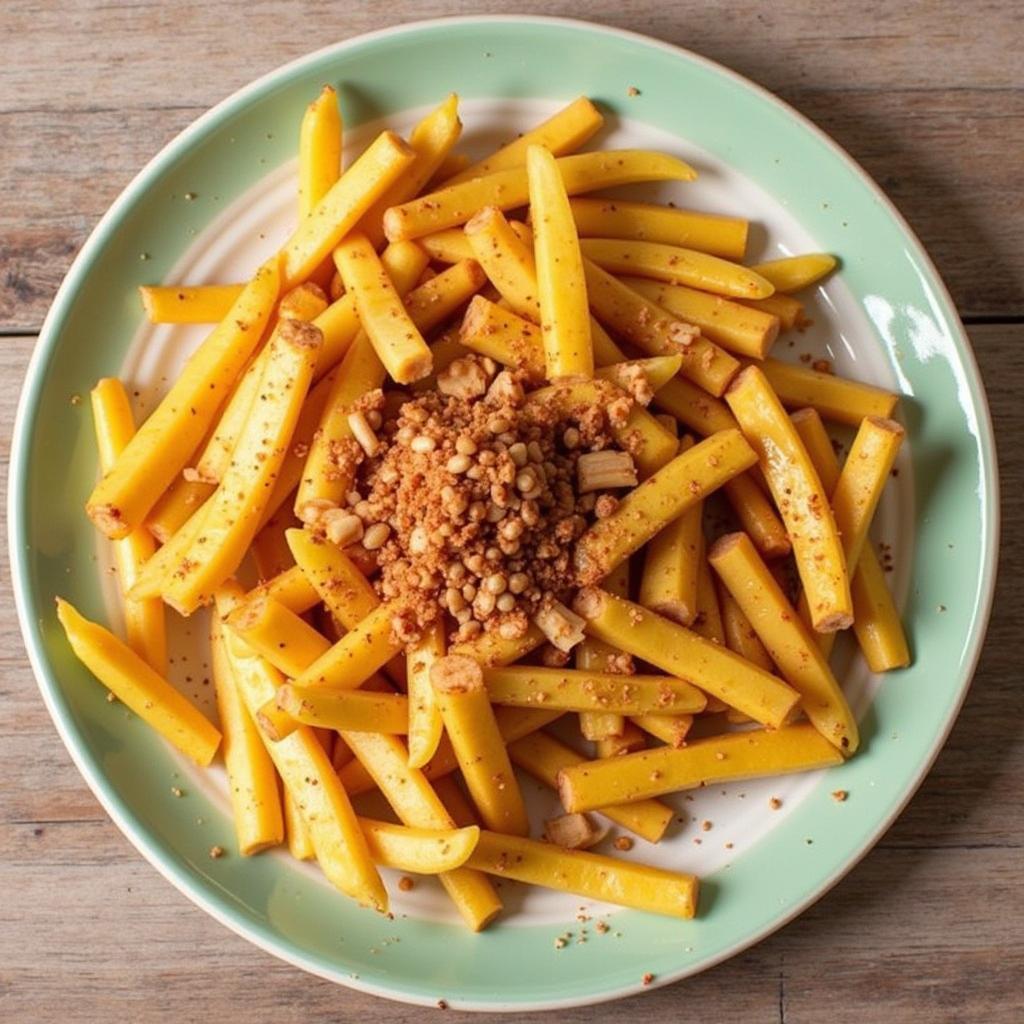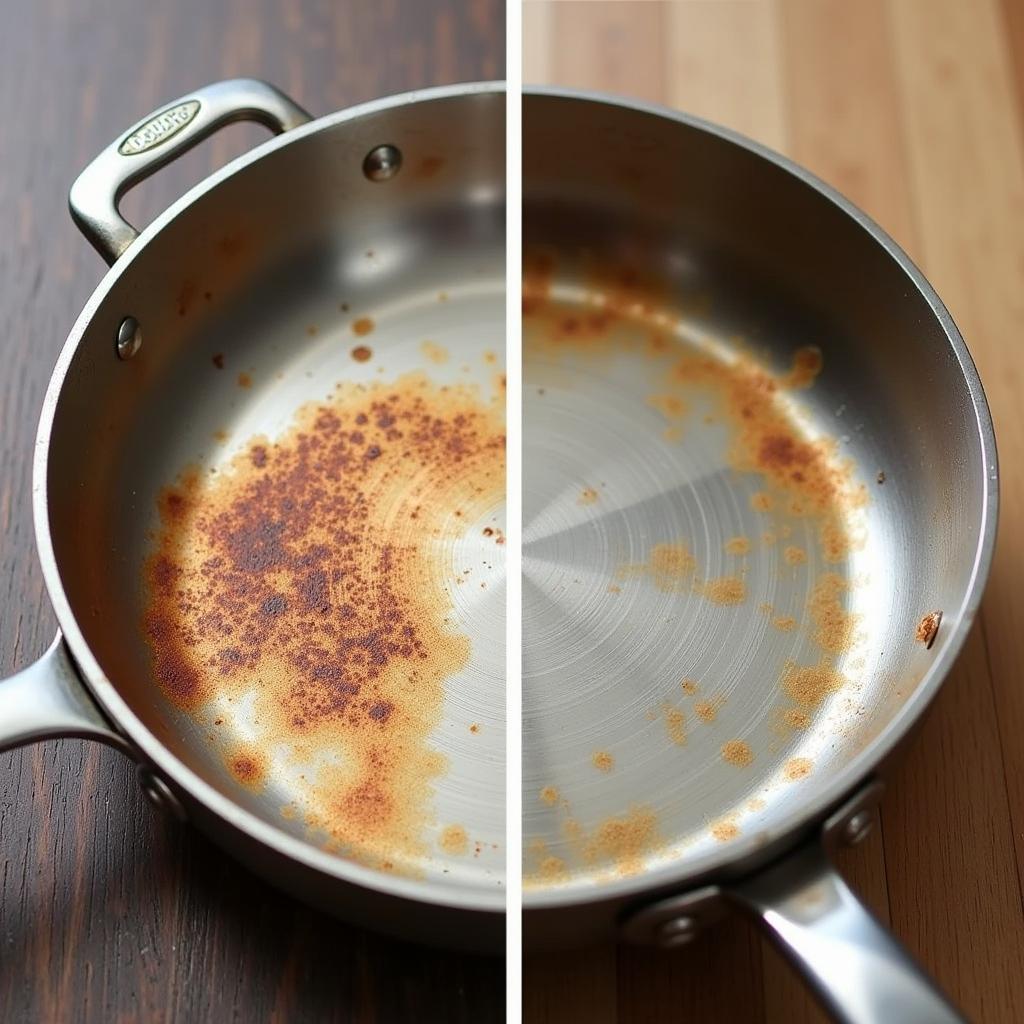When it comes to our kitchens, we want nothing but the best and safest for our families. That includes ensuring our cookware is free from rust, which not only affects the appearance but also the quality of our food. But with so many rust removers on the market, finding a Food Safe Rust Remover can feel like navigating a minefield of chemicals and confusing labels.
Fear not, fellow food enthusiasts! This comprehensive guide will equip you with all the knowledge you need to confidently choose and use food safe rust removers, leaving your cookware gleaming and your meals worry-free.
Understanding the Need for Food Safe Rust Removers
Before we delve into the specifics, let’s address why using a food safe rust remover is crucial. Traditional rust removers often contain harsh chemicals that can leach into your food, posing potential health risks.
 Food contaminated by rust remover
Food contaminated by rust remover
These chemicals can be especially harmful to young children, pregnant women, and individuals with sensitivities. By opting for a food safe alternative, you’re prioritizing the well-being of yourself and your loved ones.
Exploring Food Safe Rust Removal Methods
Thankfully, you don’t need harsh chemicals to combat rust effectively. Several natural and food safe methods can restore your cookware’s shine without compromising your health. Let’s explore some of the most popular options:
1. The Power of Vinegar
Vinegar, a staple in most kitchens, is a potent natural cleaner and rust remover. Its acidic nature effectively breaks down rust, making it easy to wipe away.
How to Use Vinegar for Rust Removal:
- Soak: Submerge the rusty item in vinegar or create a paste with vinegar and baking soda for stubborn rust.
- Wait: Allow it to sit for a few hours or overnight, depending on the severity of the rust.
- Scrub: Use a scrub brush or steel wool to remove the loosened rust.
- Rinse: Thoroughly rinse the item with water and dry it completely.
2. Lemon Juice: A Refreshing Solution
Similar to vinegar, lemon juice’s citric acid works wonders on rust. Its fresh scent is a bonus!
To Use Lemon Juice:
- Apply: Sprinkle salt on the rusted area and squeeze lemon juice over it.
- Scrub: Let it sit for a few hours, then scrub with a brush or steel wool.
- Rinse and Dry: Rinse thoroughly and dry completely.
 Shiny pots and pans after cleaning
Shiny pots and pans after cleaning
3. Baking Soda: A Gentle Scrub
Baking soda’s mild abrasiveness makes it ideal for gently scrubbing away rust without scratching your cookware.
Instructions for Using Baking Soda:
- Make a Paste: Create a thick paste by mixing baking soda with water.
- Apply: Apply the paste to the rusted area.
- Scrub: Gently scrub with a brush or cloth.
- Rinse and Dry: Rinse the item thoroughly and dry it well.
Choosing the Right Food Safe Rust Remover
While the above methods are highly effective, you can find commercially available food safe rust removers that offer convenience and specialized formulations.
When choosing a commercial product:
- Read the Label: Always choose products specifically labeled as food safe or non-toxic.
- Check the Ingredients: Look for natural ingredients like citric acid, lactic acid, or plant-based surfactants.
- Research the Brand: Opt for reputable brands with positive customer reviews.
Preventing Future Rust
Prevention is always better than cure. By taking a few simple precautions, you can keep your cookware rust-free for longer:
- Dry Thoroughly: Always ensure your cookware is completely dry before storing it.
- Proper Storage: Store cookware in a dry, well-ventilated area. Avoid stacking damp items.
- Season Cast Iron: Regularly season your cast iron cookware to prevent rust formation.
- Address Rust Immediately: Don’t let rust fester. Treat it as soon as you notice it.
Food Safe Rust Remover FAQs
1. Can I use any type of vinegar for rust removal?
White vinegar is the most effective for rust removal due to its higher acidity.
2. How long does it take for vinegar to remove rust?
Depending on the severity, it can take anywhere from a few hours to overnight.
3. Is baking soda abrasive enough to damage my cookware?
Baking soda is a gentle abrasive and unlikely to damage most cookware. However, it’s best to use it cautiously on delicate surfaces.
4. Are commercial food safe rust removers expensive?
Prices vary depending on the brand and formulation, but many affordable options are available.
5. How often should I clean my cookware with a rust remover?
Use a rust remover only when necessary, not as a regular cleaning method.
Keeping Your Kitchen Safe and Sparkling
Maintaining a rust-free kitchen is about more than aesthetics; it’s about ensuring a safe and healthy cooking environment for you and your loved ones. By embracing food safe rust removers and adopting preventative measures, you can relish the joy of cooking with peace of mind.
Remember, a clean kitchen is a happy kitchen!
Need help with your food service needs? Contact us at Phone Number: 02437655121, Email: [email protected] or visit us at 3PGH+8R9, ĐT70A, thôn Trung, Bắc Từ Liêm, Hà Nội, Việt Nam. Our customer support team is available 24/7.
For more helpful tips on maintaining a safe and hygienic food service environment, check out our article on food service hat.